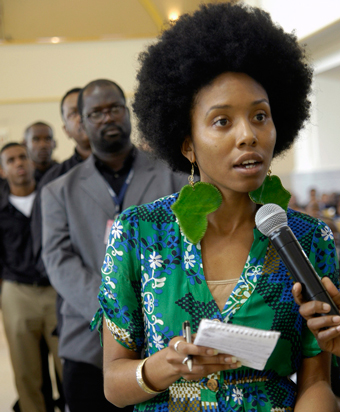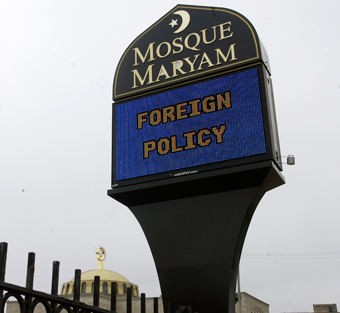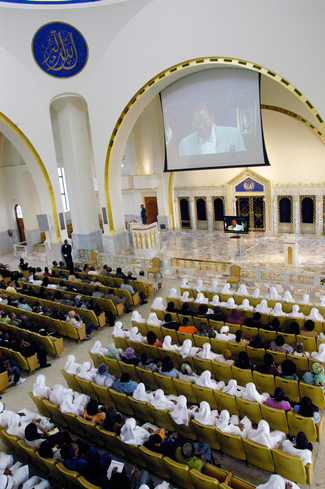Mobilizing a Nation and Black voices for peace
By Richard B. Muhammad, Starla Muhammad and Toure Muhammad Final Call Staffers | Last updated: Sep 10, 2013 - 11:44:42 AMWhat's your opinion on this article?

Amaris Selah Howard asks question during Syria forum at Mosque Maryam in Chicago.
|
The audience also heard a special rebroadcast of a message from the Minister that outlined the fallacy of U.S. military action against Syria, raised questions about whether charges Syrian President Bashar al-Asaad used chemical weapons on his own people were true, and warnings to President Obama not to strike Syria and risk igniting the Middle East. (See related stories page 2 and page 20.) At Final Call presstime, President Obama had backtracked a little, saying if the Syrians stuck by a plan to place chemical weapons under international control, the military option could be put on hold.
“We are against unjust war,” said Abdul Arif Muhammad, general counsel for the Nation of Islam and member of the Minister’s research team. It is objection to “errant” foreign policy, a policy that rapes the darker nations of the earth and policies that are wrong, he said in response to a question Sept. 8. The question and answer session followed the message by Minister Farrakhan.
Reach out to your congressman and the president and express your opposition to strikes against Syria, said Atty. Arif Muhammad.
Alongside the attorney were Student National Assistant Ishmael R. Muhammad, National Spokesperson, attorney and Student Minister Ava Muhammad and Student Minister Abdul Muhammad. The crowd at the mosque applauded loudly when the panel pointed out Minister Farrakhan’s strong opposition to U.S. warmongering since his efforts to rebuild the Nation began in the late 1970s.
The Minister has been a consistent voice, offering divine insight and foresight, so he looks into things and speaks about the future implications of actions, noted Abdul Muhammad.

From left, Abdul Muhammad, Ishmael Muhammad, Ava Muhammad and Abdul Arif Muhammad during foreign policy discussion at Nation of Islam headquarters mosque.
|
Ishmael Muhammad announced that members of the Nation of Islam would be joining anti-war protests on the streets of America. Public protests are rare for the Nation, but the announcement drew applause from Zakkiyah Muhammad and Dorothy Lewis, who have been active in the anti-war movement but worried about the lack of Black participation. “We are the moral conscience of this country,” said Zakiyyah Muhammad, who helped lead a Saturday demonstration through downtown Chicago the day before the mosque meeting.
Student Minister Ishmael Muhammad said it is the responsibility of those that receive the truth to spread that message to others.
“So lifting our voices along with the voice of reason and conscience God has given to us in the Honorable Minister Louis Farrakhan in particular, along with others to let our government know that the will of the people is for us to stay out of other people’s affairs,” he told the audience.
The will of the American people is for America to stop her mischief making and trouble making he added.

The Sunday program at Mosque Maryam Sept. 8 was devoted to errant U.S. foreign policy.
“I think it’s important that Black people have an international lens. I know that we have a tendency to focus on the local lens in terms of what’s happening specifically in our neighborhood or our street and not really broadening our perspective. What impacts the international community trickles down and impacts the Black community in so many detrimental ways.” —Amena Karim, Member of the Nation of Islam |
No other Black leader is raising the consciousness of Black people into what is happening internationally involving U.S. foreign policy and how it affects the darker people of the planet in Africa, the Caribbean and other parts of the earth, said Ishmael Muhammad.
When asked if a U.S. bombing of Syria could set up climate in which America could arrest Min. Farrakhan or members of the Nation of Islam, Attorney Ava Muhammad reminded the audience of how the Hon. Elijah Muhammad was arrested and incarcerated during World War II. The Nation of Islam patriarch was over the age required for the military draft. However the U.S. government under then President Franklin D. Roosevelt arrested Mr. Muhammad under trumped up charges of draft evasion.
“They simply did not want him preaching Islam while they were engaged in an act of war. And so clearly there is such a thing within the parameters of U.S. law that would allow them to charge us with sedition. That would allow them to charge us with treason and a myriad of charges,” said Atty. Ava Muhammad
In the aftermath of the 9/11 attacks it was no longer acceptable for U.S. citizens or those that “think” they are to express their views on U.S. foreign policy, she explained.
Dirk “Don Dirk” Acklin, co-founder of the Black Disciple Nation street organization in a heartfelt testimony, posed the last comments of the day to the panel. Mr. Acklin said he was representing those, like himself, who have spent time in the prisons of America and upon release are still viewed as non-citizens.
Now an activist in the streets, Mr. Acklin urged the Black community to come together and thanked the Nation of Islam and Min. Farrakhan for dedicated work uplifting the masses of people who are ignored.
“We do need to hit these streets by the multitudes and that’s serious. We can’t keep doing this separately and expect to win,” Mr. Acklin said to audience applause. Mr. Acklin shared how he learned from the writings and books of the Honorable Elijah Muhammad. One lesson is Black people can finance and support their own operations and programs to benefit their communities, he said.
“I came back from where the Honorable Elijah Muhammad first was putting his feet down, this work down and the F.O.I. was moving out. Even though I was in the penitentiary at a young age, didn’t understand what was going on, but I was reading the books that he was putting out and today its affecting me, I see,” said Mr. Acklin.
“The message today was absolutely insightful and informative. The key things I took away from it, what I can do, is to raise consciousness, to teach the youth the truth about what’s going on in our country and abroad, what the government is doing and is involved in as well as being very active in being non-compliant with what’s going,” said Amaris Selah Howard, a 31-year-old poet-activist, who had a chance to ask and have her question answered.

Audience in Chicago watches recorded message warning against war with Syria.
|
“Today’s lecture, ‘The Time and What Must be Done’ from the Minister was and is always informative. He’s always putting us on point to what we need to do, and what must be done. Not only in our local neighborhoods, but to bring our awareness about what’s going on internationally like in Syria. Getting this information today, it’s like gold. We don’t get that information all the time because the media doesn’t always give the truth; they distort the truth,” said Eric Johnson, 44, of Chicago. “It puts us as Black Americans in a place where we know what to do. It’s always a pleasure to come here and get this information. I’d be lost without it. I will support the Minister in any way I can, with my presence, my finances and my intellect.”
“I did not know that American soldiers were over there (in Iraq) raping the women and killing innocent people. It’s a good history lesson today and something to think about,” 38-year-old Natasha Clark said.
“I think it’s important that Black people have an international lens. I know that we have a tendency to focus on the local lens in terms of what’s happening specifically in our neighborhood or our street and not really broadening our perspective. What impacts the international community trickles down and impacts the Black community in so many detrimental ways. So it’s good. Today’s lecture I felt, it was not only timely, but it was relevant and necessary,” commented Amena Karim, who is in her late 30s and was born in the Nation of Islam.
“Today was a powerful input on my life, to impact my three boys. The war on Syria is going to cause a crisis because we are stepping in somebody else’s tub. Allah gives us a portion to drink out of our own cup, but when you drink out of someone else’s cup you pay for it,” said Salaam Johnson, 29. “The best we can do is stay in our lane and thank God for what we have. It’s a lot of problems in America that we need to take care of. Why should we go to someone else’s backyard and cut their grass when our yard looks like a forest? I thank the Minister for his lecture today.”
INSIDE STORIES AND REVIEWS
-
-
About Harriett ... and the Negro Hollywood Road Show
By Rabiah Muhammad, Guest Columnist » Full Story -
Skepticism greets Jay-Z, NFL talk of inspiring change
By Bryan 18X Crawford and Richard B. Muhammad The Final Call Newspaper @TheFinalCall » Full Story -
The painful problem of Black girls and suicide
By Charlene Muhammad -National Correspondent- » Full Story -
Exploitation of Innocence - Report: Perceptions, policies hurting Black girls
By Charlene Muhammad -National Correspondent- » Full Story -
Big Ballin: Big ideas fuel a father’s Big Baller Brand and brash business sense
By Bryan Crawford -Contributing Writer- » Full Story






 Click Here Stay Connected!
Click Here Stay Connected!








